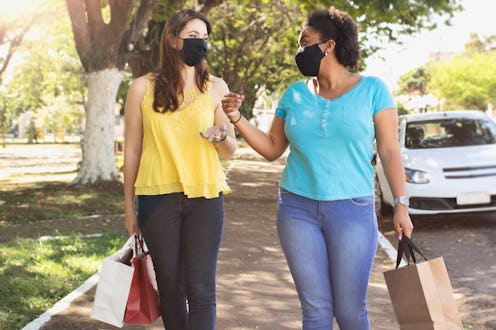Health
Doctors Explain How To Prepare If You’re Hosting A Kickback
You’re only as safe as your least cautious friend.

Yes, we're still in a pandemic, but hanging out six feet away from six of your closest buddies is fine, right? Not so fast. Contact tracing has revealed that a significant portion of recent coronavirus cases in the U.S. can be traced back to small gatherings, where people may let their social distancing guard down. Those kickbacks and little BBQs with friends might be riskier than you think. Having a small event safely involves more than buying napkins and baking cookies: it's about doing your research and taking every precaution.
"According to the Centers for Disease Control and Prevention (CDC), the safest ways to meet or hold an event continue to be through virtual methods, such as virtual events or video conferences," Dr. Seema Sarin M.D., director of lifestyle medicine at EHE Health, tells Bustle. That means Zooming from your kiddie pool with a mimosa in hand. (Which, to be fair, sounds awesome.)
If you really, really, really need to see your three best friends IRL before they move across the country, a little homework is in order. Look up your community's coronavirus statistics, Dr. Janette Nesheiwat M.D. tells Bustle. "If there is a low prevalence in the community with less than 5% positivity rate, it may be safe to be in small gatherings of no more than 10 people," she says. "However, it is still recommended to wear a mask if you’re unable to physical or social distance, as we should not forget about asymptomatic carriers." If you're planning to eat or drink, a face shield can be a good compromise.
How Small Is A Small Gathering In The Pandemic, Anyway?
A tiny guest list in the outdoors is ideal, Dr. John A. Sellick D.O., professor in the Department of Medicine at the University of Buffalo, tells Bustle, if local coronavirus rates are low enough. "Drinks or a meal, with proper distancing, outdoors on the patio is likely safe for a small group of maybe four to eight." Increasing the group to 10 to 15 people, he says, will increase the risk, because guests will want to join group conversations and mingle, thereby potentially spreading virus around.
However, "There is no body of scientific studies to say six people is good, 10 is bad," he adds. It's a good idea to communicate with everybody about how recently they've been tested, and how cautious they're being. If one of the potential guests just posted pictures from a 35-person barbecue where they only knew the host, consider asking them to stay home. Remember that even if you're only inviting two or three people over for drinks, it only takes one person with the illness to infect everyone present.
How To Safely Meet Up With Friends During The Pandemic
Any small gatherings should definitely be outdoors, Dr. Sarin says. "Being inside a building usually doesn't offer the space necessary to socially distance, even in a small group, and indoor ventilation may also not be effective in curbing the spread of respiratory droplets between attendees," she says. Indoor small events need to have adequate ventilation — lots of open windows, for instance — and enough room for everybody to stay six feet apart at all times. If not, it's not going to be safe.
As a guest, you can take other precautions. Dr. Sarin recommends spending limited time at small events. "The less time you're there, the lower your risk for spreading or contracting COVID-19," she says. Cover your nose and mouth when sneezing or coughing, wash your hands frequently, and try not to touch your nose or mouth, she says. If you're feeling unwell, or have been in contact with somebody who's recently tested positive for COVID-19, take a rain check.
"Remember that this is a highly contagious, infectious virus that can spread easily from person to person when given the opportunity," Dr. Nesheiwat says. Right now, the rule about small gatherings is: if in doubt, stay home.
Experts:
Dr. Janette Nesheiwat M.D.
Dr. Seema Sarin M.D.
Dr. John A. Sellick D.O.